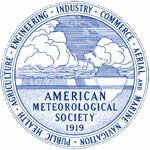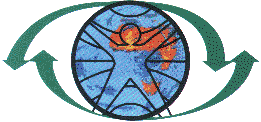S&T News
American Meteorological Society's Summer
Policy Colloquium June 4-13, 2006
 The AMS Summer Policy Colloquium, with support from the Paleoclimate Program of the Atmospheric Sciences Division of NSF, brings a select group to Washington, D.C. for an intense, ten-day immersion in atmospheric policy. The Colloquium:
The AMS Summer Policy Colloquium, with support from the Paleoclimate Program of the Atmospheric Sciences Division of NSF, brings a select group to Washington, D.C. for an intense, ten-day immersion in atmospheric policy. The Colloquium:
- Provides an overview of policy basics, and how decisions are made governing the course and future of atmospheric science;
- Provides opportunities for participants to meet and dialog with the federal officials, Congressional staffers, and others who make those decisions;
- Surveys current atmospheric policy issues;
- Uses the case study method to explore a limited number of issues, both past and present, in depth and detail;
- Helps participants build skills, experience, and contacts they can use throughout their careers to understand and influence the atmospheric policy process;
- Helps participants gauge their aptitude for and interest in the challenges of matching atmospheric science to national priorities, and scientific program leadership.
Who can attend? Participants include:
- Mid-level federal managers and scientists
- Mid-level private-sector executives
- University faculty
- Selected graduate students of demonstrated scientific and leadership potential
- (Under exceptional circumstances) undergraduate applications will be considered.
How do I apply? Total enrollment is limited to 50. Up to 38 paying participants will be accepted on a first come, first served basis. In addition, the Paleoclimate Program of the Atmospheric Sciences Division of the National Science Foundation will fund up to 10 students who will be selected and given full financial support on the basis of a national competition. Support is also available for up to 2 faculty members from minority serving institutions.
To be eligible, students should be U.S. Citizens and AMS (student) members, or applicants for student membership. All applicants must fill out the appropriate registration form. The fee for this year's colloquium will be $4600 for federal and private sector employees and university faculty which includes all course materials, a continental breakfast, lunch, and breaks each day, as well as two banquets. For more information and an application form visit the colloquium website.
Science & Technology in Society: An International Multidisciplinary Graduate Student Conference, April 22nd – 23rd, 2006
 This annual conference provides a forum for graduate students from a variety of disciplinary and interdisciplinary programs to present their research on the policy and social studies of science and technology. In addition to presenting papers, students will have the opportunity to interact with each other and prominent scholars and professionals related to their field(s) of interest. Andrew Jamison of Aalborg University, Denmark is one of our keynote speakers this year and will speak about “Hubris and Hybrids in Science Policy.” The deadline for abstracts has passed but the registration deadline is April 14.
This annual conference provides a forum for graduate students from a variety of disciplinary and interdisciplinary programs to present their research on the policy and social studies of science and technology. In addition to presenting papers, students will have the opportunity to interact with each other and prominent scholars and professionals related to their field(s) of interest. Andrew Jamison of Aalborg University, Denmark is one of our keynote speakers this year and will speak about “Hubris and Hybrids in Science Policy.” The deadline for abstracts has passed but the registration deadline is April 14.
For more information and to register visit the website.
American Association for the Advancement of Science Headquarters, Washington, DC
Sponsored by: American Association for the Advancement of Science, the National Science Foundation, George Mason University, George Washington University, and Virginia Tech.
An Earth System Science Partnership, Global Environmental Change Open Science Conference - Beijing, China, 9-12 November 2006
 The ESSP Open Science Conference programme will emphasize plenary sessions in order to meet the Conference objective of bringing together practitioners from many different disciplines to focus on the integrated Earth System approach to global environmental change research. Immediately prior to the main Conference, the 2nd International Young Scientists (YSC) Global Change Conference (7-8 November 2006), organized by the ESSP SysTem for Analysis Research and Training (START), will convene in Beijing. For more details, please access the START website.
The ESSP Open Science Conference programme will emphasize plenary sessions in order to meet the Conference objective of bringing together practitioners from many different disciplines to focus on the integrated Earth System approach to global environmental change research. Immediately prior to the main Conference, the 2nd International Young Scientists (YSC) Global Change Conference (7-8 November 2006), organized by the ESSP SysTem for Analysis Research and Training (START), will convene in Beijing. For more details, please access the START website.
For more information about the ESSP OSC, please visit the aforementioned ESSP Conference websites. If, however, you have any specific questions, then please contact:
Martin Rice, ESSP CoordinatorEmail: mrice@essp.org
Website: http://www.essp.org
IDGEC Synthesis Conference, 6-9 December 2006 Bali, Indonesia
 Institutional research is at a turning point. Over the past seven years the IHDP project on the Institutional Dimensions of Global Environmental Change (IDGEC) has promoted and stimulated a broad range of research into the ways in which institutions cause and alleviate global environmental problems. The project has investigated institutions as both independent and dependent variables. IDGEC research is now yielding results and findings that change the way we view the theory and practice of institutions. The project is now conducting a synthesis process to garner and wrest meaning from the body of findings. The culmination of this process will be the Synthesis Conference, Institutions for Sustainable Development in the Face of Global Environmental Change: Questioning, Explaining, Demysifying (QED), to be held in Bali, Indonesia, 6-9 December 2006.
Institutional research is at a turning point. Over the past seven years the IHDP project on the Institutional Dimensions of Global Environmental Change (IDGEC) has promoted and stimulated a broad range of research into the ways in which institutions cause and alleviate global environmental problems. The project has investigated institutions as both independent and dependent variables. IDGEC research is now yielding results and findings that change the way we view the theory and practice of institutions. The project is now conducting a synthesis process to garner and wrest meaning from the body of findings. The culmination of this process will be the Synthesis Conference, Institutions for Sustainable Development in the Face of Global Environmental Change: Questioning, Explaining, Demysifying (QED), to be held in Bali, Indonesia, 6-9 December 2006.
We are seeking proposals for papers to be presented at the synthesis conference that advance the science relevant to the major themes and activities of the IDGEC Science Plan.
Extended deadline for paper abstracts and poster proposals: 1 March 2006
For more information click here.
Gordon Research Conference on Science and Technology Policy
Big Sky, MT, August 13-18, 2006
From science and technology inputs to policy outcomes: What are the determining factors?
 Science and technology policy represents a truly transdisciplinary topic that crosses academe, government and industry and requires both theoretical and practical perspectives. While one can currently identify individual science and technology policy interests and agendas, there are few explanatory models or even best practice guidelines that relate science and technology inputs with policy outcomes or, on the other hand, policy inputs with science and technology outcomes. Indeed, scientists often complain that policymakers do not listen to them or “the science;” policy makers often complain that scientists not only fail to understand what it means to make policy, but also fail to provide information in formats that can be used successfully to make policy. Too often, policy discussions focus on funding rather than impact. Through comparative research and comparison of research, the goal of STP-GRC will be to discern critical variables in the relationships between inputs and outcomes. This will be accomplished
Science and technology policy represents a truly transdisciplinary topic that crosses academe, government and industry and requires both theoretical and practical perspectives. While one can currently identify individual science and technology policy interests and agendas, there are few explanatory models or even best practice guidelines that relate science and technology inputs with policy outcomes or, on the other hand, policy inputs with science and technology outcomes. Indeed, scientists often complain that policymakers do not listen to them or “the science;” policy makers often complain that scientists not only fail to understand what it means to make policy, but also fail to provide information in formats that can be used successfully to make policy. Too often, policy discussions focus on funding rather than impact. Through comparative research and comparison of research, the goal of STP-GRC will be to discern critical variables in the relationships between inputs and outcomes. This will be accomplished
by bringing together members of the highly diverse science and technology policy community to present and discuss current empirical studies. Building networks within this community will advance the critical work of developing a robust field of research in science and technology policy.
The conference will be organized in four components: the opening session will introduce key concepts in science and technology policy; the next three days will be focused on empirical studies in which science and technology issues are analyzed in lecture/discussion sessions and posters; subsequently, as an analytic and empirical tool within the program itself, the next session will be dedicated to meta-analysis of the foregoing empirical presentations; finally the closing session will address how uncertainty influences the possibility of establishing credible policy.
First Call for Poster Proposals
Deadline: February 28, 2006 (rolling thereafter)
Posters sessions are a fixture of scientific conferences, and they can be an effective and memorable way of communicating ideas that might otherwise be missed and for provoking conversations that might otherwise never develop. Posters are an integral part of the Gordon conference, enriching the exchange of ideas by complementing oral presentations and large group discussions as well as by stimulating collegial interactions among participants. Poster presenters will engage in conversation about their posters with other participants during relaxed afternoon and/or evening sessions. Every attendee is welcome and encouraged to propose a poster. Early career participants are especially encouraged to present posters at the conference.
The deadline for submission of poster abstracts is February 28, 2006, with consideration and acceptances continuing on a rolling basis until the available positions are filled. Abstracts should be 250-300 words in length, and clearly describe the research question(s) addressed, the methodology employed, and the argument to be made. Poster proposals will be judged according to the following criteria:
- Relevance to overall meeting themes (for more details, please see the conference website or to emerging themes for science/technology policy not covered in this research conference such as homeland security and terrorism, nanotechnology, global warming, and information technology;
- Quality, clarity, and originality of ideas;
- Appropriateness for presentation as a poster, including the potential for visual representations and graphics to support the arguments;
- Priority for junior, international, and independent scholars (please indicate your status on your submission).
Upon acceptance, you will be provided with an official letter of acceptance which may be helpful in soliciting funds or grants to assist in your attendance at the conference. Further information will be provided regarding funds from the conference organizers.
If you have no experience preparing a poster presentation, the Poster Committee may offer help. For more information, to begin developing a poster idea, or to submit an abstract, please email the Poster Committee Chair: Rachel Ankeny (rankeny@science.usyd.edu.au).
For more information on the Conference generally, please contact the co-chair: Fred Grinnell (frederick.grinnell@utsouthwestern.edu).

